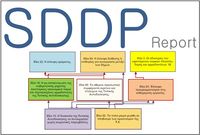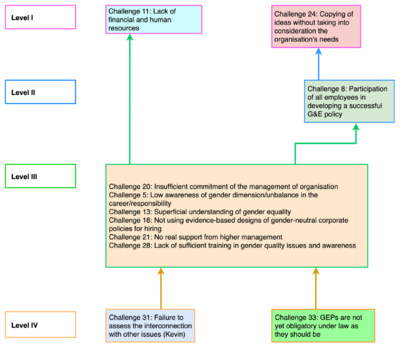R-I-Peers - Athens Virtual SDD Obstacles we face when designing and implementing GEPs: Difference between revisions
No edit summary |
|||
| Line 2: | Line 2: | ||
|acronym=[[R&I PEERS]] | |acronym=[[R&I PEERS]] | ||
|book_image=SDDP_Report_Image.jpg | |book_image=SDDP_Report_Image.jpg | ||
|report_title=[[ | |report_title=[[Obstacles we face when designing and implementing GEPs in R-I-PEERS - Athens SDD]] | ||
|project=[[R&I PEERS]] | |project=[[R&I PEERS]] | ||
|Triggering_Question=What | |Triggering_Question= What barriers or obstacles do we face when designing and implementing GEPs? | ||
|location= | |location=Athens | ||
|dates= | |dates=2021 | ||
|LeadFacilitator=[[ | |LeadFacilitator=[[Yiannis Laouris ]] | ||
|AsFacilitator=[[ | |AsFacilitator=[[Marcus - Kevin]] | ||
|author= | |author=[[Jordan Kent]] | ||
|editor= [[Yiannis Laouris ]] | |editor= [[Yiannis Laouris ]] | ||
|total_duration=9 hrs | |total_duration=9 hrs | ||
| Line 22: | Line 22: | ||
==Executive Summary== | ==Executive Summary== | ||
TThe Mutual Learning Workshop "What are the best practices to overcome problems, barriers, issues when implementing your GEPs?" was organised virtually (Due to the Covid-19 pandemic and the consequent sanctions and difficulties in traveling abroad, the consortium of the project decided to deliver the workshop virtually) over 4 sessions using Zoom on the dates shown below. The Greek partner, ISOTITA has sent the invitation 6 weeks before the event to many national, some international and all partners. | |||
* 16/12/2021 (30 min) Preparatory for introductions and to explain the process | |||
* 13/1/2022 (2 hrs) Collection and Clarification of contributions | |||
* 20/1/2022 (2 hrs) Clustering | |||
* 27/1/2022 (2 hrs) Structuring and Road Mapping | |||
Yiannis Laouris, from the Cyprus Neuroscience & Technology Institute (CNTI) has served as the Facilitator. | |||
in the context of the project [[R&I PEERS]] funded by the European Union’s Horizon 2020 Research and Innovation Programme, | |||
The workshop, which was realised using the participatory methodology of the Structured Democratic Dialogue (SDD), brought together fifteen (15) experts from the gender equality field representing universities, governmental and scientific bodies as well as enterprises to discuss the existing practices across Gender Equality Plans (GEPs). | The workshop, which was realised using the participatory methodology of the Structured Democratic Dialogue (SDD), brought together fifteen (15) experts from the gender equality field representing universities, governmental and scientific bodies as well as enterprises to discuss the existing practices across Gender Equality Plans (GEPs). | ||
<br> | <br> | ||
<u>The [[Triggering Question]] (TQ) of the workshop was: </u><br> | <u>The [[Triggering Question]] (TQ) of the workshop was: What barriers or obstacles do we face when designing and implementing GEPs?</u><br> | ||
'''"What existing practices can be identified to facilitate the development and implementation of Gender Equality Plans (GEPs) in academia and research organisations?"''' | '''"What existing practices can be identified to facilitate the development and implementation of Gender Equality Plans (GEPs) in academia and research organisations?"''' | ||
In response to the TQ, the | In response to the TQ, the XX participants came up with 54 ideas, which were categorized in 4 clusters. Following the voting process, 22 ideas received one or more votes and were structured to create the influence MAP shown below. <br> | ||
Cluster 1- Commitment: | |||
Cluster 2- Resources: | |||
Cluster 3- Knowledge-Awareness: | |||
Cluster 4- Conflict with existing HR | |||
Cluster 5- Inclusion of employees | |||
Cluster 6- Evaluation | |||
Cluster 7- Not evidence-based | |||
Cluster 8- Environment: | |||
Cluster 9- Beaurocracy | |||
Cluster 10- Insufficient Measures | |||
Cluster 11- Research | |||
<br> | <br> | ||
Revision as of 07:25, 15 August 2022
|
Executive Summary
TThe Mutual Learning Workshop "What are the best practices to overcome problems, barriers, issues when implementing your GEPs?" was organised virtually (Due to the Covid-19 pandemic and the consequent sanctions and difficulties in traveling abroad, the consortium of the project decided to deliver the workshop virtually) over 4 sessions using Zoom on the dates shown below. The Greek partner, ISOTITA has sent the invitation 6 weeks before the event to many national, some international and all partners.
- 16/12/2021 (30 min) Preparatory for introductions and to explain the process
- 13/1/2022 (2 hrs) Collection and Clarification of contributions
- 20/1/2022 (2 hrs) Clustering
- 27/1/2022 (2 hrs) Structuring and Road Mapping
Yiannis Laouris, from the Cyprus Neuroscience & Technology Institute (CNTI) has served as the Facilitator. in the context of the project R&I PEERS funded by the European Union’s Horizon 2020 Research and Innovation Programme,
The workshop, which was realised using the participatory methodology of the Structured Democratic Dialogue (SDD), brought together fifteen (15) experts from the gender equality field representing universities, governmental and scientific bodies as well as enterprises to discuss the existing practices across Gender Equality Plans (GEPs).
The Triggering Question (TQ) of the workshop was: What barriers or obstacles do we face when designing and implementing GEPs?
"What existing practices can be identified to facilitate the development and implementation of Gender Equality Plans (GEPs) in academia and research organisations?"
In response to the TQ, the XX participants came up with 54 ideas, which were categorized in 4 clusters. Following the voting process, 22 ideas received one or more votes and were structured to create the influence MAP shown below.
Cluster 1- Commitment:
Cluster 2- Resources:
Cluster 3- Knowledge-Awareness:
Cluster 4- Conflict with existing HR
Cluster 5- Inclusion of employees
Cluster 6- Evaluation
Cluster 7- Not evidence-based
Cluster 8- Environment:
Cluster 9- Beaurocracy
Cluster 10- Insufficient Measures
Cluster 11- Research
According to the participants of this workshop, the practices that appear to be the most influential were:
- Practice #6: (2 votes) Monitoring gender & diversity state-of-art, gathering gender disaggregated quantitative & qualitative data
- Practice #7: (6 votes) Collection of gender equality data from existing admin database
- Practice #16: (3 votes) Presence of females in the board to select new researchers
- Practice #26: (3 votes) Try to attract more males in Gender Equality Committees
- Practice #27: (4 votes) Introduce some basic gender curricula in STEM
The workshop was facilitated by Andreas P. Andreou.

